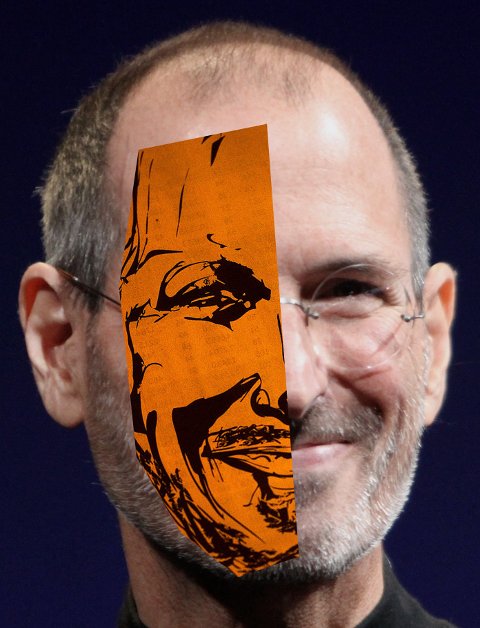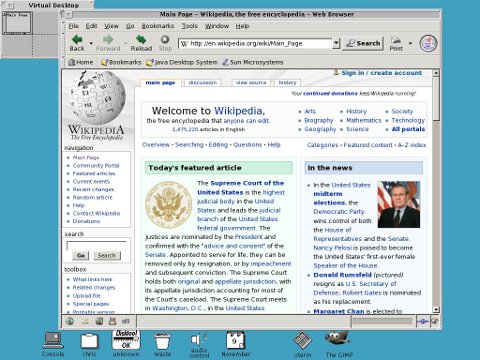05.21.12
Posted in Interoperability, Oracle, Patents, SUN at 6:49 am by Dr. Roy Schestowitz

Summary: An old position paper from Sun Microsystems helps shows a certain resistance to patents such as those which Oracle uses against Android
GROKLAW has some superb coverage of the Oracle vs. Google case, so as the trial kicks into full gear we mostly refrain from covering it. A lot of bloggers use Groklaw as a source while providing summaries.
One interesting post from Groklaw shows Sun’s position on software patents.
“I can’t find it on Oracle’s website any more,” writes Pamela Jones, “but thanks to Internet Archive, we can find Sun Microsystems writing about software patents in 2006 and explaining its position. This was back when the European Union was for a while considering adopting software patents. You will not believe what Sun’s position was. It’s definitely relevant to the Oracle v. Google litigation.
“Sun’s position paper was titled, “Software Patents: A European Union (EU) Directive on the Patentability of Computer-Implemented Inventions must not Jeopardize Interoperability.” The title says it all, but I’m going to show the entire statement to you in all its glory, so Oracle can’t pretend, as it tried unsuccessfully to do with the Jonathan Schwartz corporate blog, that it wasn’t an official company statement. Sun strongly urged that Europe, if it adopted the Directive, “allow for the creation of products which can interoperate with the protected products to safeguard competition in the sector and to provide greater choice and lower costs for consumers.”
“Imagine that. Sun said publicly that interoperability was more important than IP rights, even patents, because it led to competition and hence greater choice and lower costs for consumers.”
Can this be used to weaken Oracle’s case? We shall see. █
Permalink
 Send this to a friend
Send this to a friend
01.27.11
Posted in Free/Libre Software, Microsoft, Open XML, OpenDocument, Patents, SUN at 1:06 am by Dr. Roy Schestowitz

(ODF | PDF | English/original)
Resumen: El impuesto de patentes no aceptable en los territorios pública se refiere, pero las autoridades necesitan revisar las normas existentes.
Las cuestiones de Adquisiciones han sido cubiertos por Simon Phipps desde hace unos años, incluso antes, cuando trabajó para Sun Microsystems. En su más reciente artículo[http://blogs.computerworlduk.com/simon-says/2011/01/procurement-indemnity/index.htm] que escribe sobre el uso de patentes para discriminar al Libre/Software de Código Abierto, comenzando con: [via[http://webmink.com/2011/01/21/procurement-and-indemnity/?utm_source=twitterfeed&utm_medium=laconica]]
En todo el mundo, me encuentro con los gobiernos y los países que afirman tener una política que permite o incluso favorecen al software de código abierto. Sin embargo, cuando en realidad veo lo que están haciendo, te encuentras con que todavía adquieran una gran cantidad de software propietario.
Una política por sí sola no es suficiente. Para poner en práctica, normas que el legado de contratación tiene que ser cambiado, especialmente en el gobierno. Las normas de adquisición evolucionan con el tiempo a la luz de la experiencia, y poco a poco acrecienta en un corpus considerable que es inflexible por diseño. Si bien estas normas pueden proporcionar la protección y el valor de adquisición de productos y servicios de la empresa que se ha visto antes, por lo general discriminan a nuevos enfoques, que son víctimas del “fuego amigo” de las consecuencias involuntarias e imprevistas. Las viejas normas de contratación sofocan la innovación.
Uno de los problemas más comunes que el legado de reglas de contratación causa está en el area de exigir indemnización por software. Normas de adquisición suele pedir sanciones severas a asociarse con la promesa de que el software no contiene ningúna apropiación indebida de derechos de autor, de abusos premeditados, y a sabiendas no infrinjir ninguna patente.
[...]
Este es uno de los principales problemas que hay que fijarse si tiene intención de mover su empresa hacia el software de código abierto. No es suficiente decir que lo haces, necesitará arreglar sus normas de contratación para que el software de código abierto pueda pasar a través de sus defensas.
El punto que se hace aquí es que las patentes (y derechos de autor) desempeñan un papel en la discriminación contra el libre/software de código abierto, ya sea deliberadamente o no. Se relaciona muy bien con la atroz noticia de Australia [1[http://techrights.org/2011/01/21/australia-ms-lock-in/], 2[http://techrights.org/2011/01/21/novell-influence-in-libreoffice/], 3[http://techrights.org/2011/01/20/mandating-proprietary-sw/], 4[http://techrights.org/2011/01/22/john-sheridan-owned/]], donde Microsoft propietaria y las patentes-gravadas fueron elegidos en lugar del formato ODF por un traje con la historia empresarial de Microsoft. Verlos tratando de negar lo innegable su “sesgo de Microsoft” cuando se les acercó un periodista australiano que es de investigación y coherente en favor de la libertad del software:
La política de AGIMO requiere que las agencias del gobierno apoyen la Oficina de archivo “Open” XML format/ECMA-376 norma PROMOVIDA por Microsoft, y que las mayoria de alternativa suites de oficina no puede escribir documentos. La ODF Alliance, que está apoyando a un formato rival, afirmó el año pasado el Office Open XML formato esta atiborrada con “dependencias de plataforma de Windows” (PDF) y esencialmente vinculada a los usuarios de Microsoft Office, y algunas organizaciones, tales como los Archivos Nacionales de Australia, han escogido el estándar ODF en lugar de en el largo plazo.
Sin embargo, AGIMO estableció que no hay sesgo en la elección de software.
[...]
Una de las quejas comunes de los trabajadores en las grandes organizaciones es que son incapaces de obtener acceso para instalar aplicaciones en sus ordenadores de sobremesa, lo que lleva a una frustración en el trabajo, ya que pueden ser incapaces de utilizar las aplicaciones que se utilizan, o prefieren hacer su trabajo más eficientemente. Un ejemplo sería la forma en que muchas personas utilizan los navegadores web, con extensiones muy personalizada.
Los compinches de Microsoft en el gobierno de Australia estan avergonzando a todo el país, el que está siendo observado por todo el mundo acerca de este escándalo. █
Many thanks to Eduardo Landaveri of the Spanish portal of Techrights.
Permalink
 Send this to a friend
Send this to a friend
01.22.11
Posted in Free/Libre Software, Microsoft, Open XML, OpenDocument, Patents, SUN at 12:24 pm by Dr. Roy Schestowitz

Summary: Patent tax not acceptable where public territories are concerned, but officials need to revise existing rules
Procurement issues have been covered by Simon Phipps for quite a few years, even back when he worked for Sun Microsystems. In his newest article he writes about the use of patents to discriminate against Free/open source software, starting with: [via]
All over the world, I encounter both governments and countries claiming they have a policy permitting or even favouring open source software. yet when you actually look at what they are doing, you find that there’s still a huge amount of proprietary software being procured.
A policy alone is not enough. To implement it, legacy procurement rules have to be changed, especially in government. Procurement rules evolve over time in the light of experience, and gradually accrete into a sizeable corpus that is inflexible by design. While these rules may provide both protection and value for procurement of products and services the enterprise has seen before, they typically discriminate against new approaches, which are the “friendly fire” casualties of unintended and unforeseen consequences. Legacy procurement rules stifle innovation.
One of the most common problems that legacy procurement rules cause is in the area of requiring indemnity for software. Procurement rules usually ask for substantial penalties to be associated with promises that the software doesn’t contain any misappropriated copyright, abuses no trademarks, and does not knowingly infringe any patents.
[...]
This is one of the key problems that needs to be fixed if you intend to move your enterprise to favour open source software. It’s not enough just to say you do; you’ll need to fix your procurement rules so open source software can get through your defences.
The point to be made here is also that patents (and copyrights) play a role in discriminating against Free/open source software, whether deliberately or not. It relates quite nicely to the atrocious news from Australia [1, 2, 3, 4], where Microsoft proprietary and patents-encumbered formats were chosen over ODF by a suit with Microsoft business history. Watch them trying to deny “Microsoft bias” when approached by an Australian journalist who is investigative and consistently in favour of software freedom:
AGIMO’s policy requires government agencies to support the Office Open XML file format/ECMA-376 standard promoted by Microsoft, which most alternative office suites cannot write documents in. The ODF Alliance, which is supporting a rival format, claimed last year the Office Open XML format was riddled with “Windows-platform dependencies” (PDF) and essentially tied users to Microsoft Office, and some organisations, such as the National Archives of Australia, have picked the ODF standard instead in the long-term.
However, AGIMO stated there was no software bias in the choice.
[...]
One of the common complaints of workers in large organisations is that they are unable to gain access to install applications on their desktop PCs, leading to a frustration at work as they may be unable to use the applications which they are used to, or prefer to do their work more efficiently. An example would be the way that many people use web browsers with heavily customised extensions.
Microsoft cronies in the Australian government are embarrassing the entire country, which is being watched by the entire world over this scandal. █
Permalink
 Send this to a friend
Send this to a friend
09.30.10
Posted in America, Europe, Free/Libre Software, FUD, GNU/Linux, Law, Microsoft, Oracle, Patents, Red Hat, SUN at 3:00 pm by Dr. Roy Schestowitz

Summary: A roundup of stories about the fight against software patents in the United States and the fight to ease elimination of extremely bad ones (even Microsoft supports this latter fight)
STRONG OPPOSITION is being formed against software patents and yesterday we mentioned Red Hat's filing. Ars Technica covers this right about now, arguing very clearly that Red Hat is pushing for the end of software patents.
When the Supreme Court heard the Bilski case earlier this year, it ruled that the specific business method patent at issue in the case was invalid and contended that the patentability of intangible methods should be reduced but not eliminated. The court declined to provide clarity on the scope of software patentability, however, which leaves a lot of important questions unanswered.
[...]
Red Hat’s submission was authored by Rob Tiller, the company’s vice president and assistant general counsel. He argues that a growing number of vague patents on software methods have made it impossible to guess whether a new product will face the risk of litigation. His statement contends that the resulting landscape of uncertainty discourages innovation in the software industry.
LWN has covered this too and the thread is being trolled by Microsoft Florian, who spreads disinformation as usual (daemonising Red Hat and just about anything that resembles competition to Microsoft). For those who don’t know yet, Microsoft Florian works almost exclusively with Microsoft software. He only pretends to be a “FOSS” guy. He also lobbies in favour of software patents, not against them. It’s like with ACT, where the lobbyist pretends to represent the very opposite side which he or she lobbies for. It’s a common and highly unethical lobbying technique in the United States. It’s so common because it’s very effective (something along the lines of the “I like Linux, but…” troll). For those who do not know, Microsoft Florian’s mission seems to be ‘injecting’ the Microsoft line into GNU/Linux-oriented Web sites (he blocks feedback on his own ridiculous posts). Right now he is spinning it just like Microsoft Nick, simply because there is common ground on the issue of invalidating bad patents [1, 2, 3], not the stance against software patents. Microsoft spinners would love to mix the issues and fool those who are gullible or do not verify the facts. The Linux Foundation and Microsoft (and at times even the SFLC/FSF) agreed on some issues and worked together when it came to software liability for example. This does not mean that Microsoft is a friend of the Linux Foundation. To Microsoft it’s just a selfish deed, intended to save the Office cash cow from i4i (c/f i4i vs Microsoft).
One more thing to be said about Microsoft Florian (there are more details in our IRC logs) is that he attempts to be omnipresent by allegedly pasting the same comments in many different GNU/Linux-oriented sites and then modifying them slightly. That counts as spamming, just like mass-mailing journalists with slight personalisation is a form of spamming. Microsoft Florian does both. And all this coming from the same lobbyist who called FSF “spammers” for merely asking supporters to write their own letters in support of abolishing software patents? People are entitled to write to their own government or patent office? What a hypocrite. As gnufreex put it in IRC, “Mueller is attacking Red Hat for comoditising, and at same time, he defends TH’s [TurboHercules'] right to commoditise.” Microsoft Florian just repeats his lies over and over again in many places (with different audiences).
“Truth is, if Oracle’s acquisition failed, Sun would be sold to pieces. James Gosling implicitly admitted that the other day. Some pieces would go to trolls. So Moglen is right.”
–gnufreexFor those who wonder where repeated messages are allegedly posted (and even double-posted in at least one case), the list includes Ars Technica, IT world (IDG), Computer World (IDG), LWN, Slashdot, and various blogs (he was banned from Groklaw). In Twitter, Microsoft Florian is promoting Mono, Microsoft repositories, and he is chatting with the Microsoft crowd, conspiring to smear all the groups and people who support software freedom. Microsoft MVP de Icaza even helps him smear some of those groups and sites. Perfect couple, eh?
“Florian’s points are all pretty weak,” explained to us a reader who brought some of these allegations (gnufreex). “But enough to fool the ignorant. So it is dangerous. Best bet is to elegantly refute his points. For example, his Moglen smears goes like this: “Moglen supported Oracle’s acquisition, so he is a sellout. Moglen also said that Oracle better home from Sun patents that Microsoft, and Microsoft never made bid for Sun. So Moglen is fear-mongering people against Microsoft/trying to make ‘em believe in bogeyman called Microsoft.
“Truth is, if Oracle’s acquisition failed, Sun would be sold to pieces. James Gosling implicitly admitted that the other day. Some pieces would go to trolls. So Moglen is right. Oracle is better than the alternative.”
Anyway, moving on a little, journalism on the subject of patents appears to be poor. TechDirt has just caught a good new example where a reporter could not tell the difference between copyright and software patents and thus misreported:
Michael Scott pointed us to a story from the Mass High Tech Business News claiming that Adobe had been hit with a copyright infringement lawsuit by EveryScape. That caught my eye because it’s pretty rare for there to be copyright infringement claims between software companies, since there needs to be actual copying of the code in question (in most cases), and that’s pretty rare. And, reading the article, it didn’t sound like anyone was actually alleging copying of code. The more I read, the more I suspected that the reporter just got the story totally wrong, and that this had to be a patent infringement case, rather than a copyright one.
And, indeed, that’s what it appears to be. The company EveryScape, appears to have two patents (7,327,374 and 7,593,022) on the technology being discussed here. I get that not everyone recognizes the differences between copyrights, patents and trademarks, but honestly, if you’re passing yourself off as a high tech publication, it seems like you should be able to get the basics down.
Here is one letter which has just been sent to the USPTO to protest against software patents:
I am a US citizen and software engineer. I am a named inventor on at least three patents (numbers 7,346,839, 7,409,383, and 7,783,639) and am named as an inventor for numerous pending patent applications. I am employed by Google, Inc.; this letter represents my personal opinion and not necessarily that of my employer.
Software patents are a significant threat to innovation in the software industry and, by extension, all of America’s technology-related businesses. While I understand the theoretical case that software patents can foster innovation – by encouraging investment and advancing the state of the art through disclosure – I have not seen this to be the case in any way in the software industry.
Software patents are not wanted even by American software engineers, but can they outnumber the patent lawyers and the lobbyists of software monopolists? It usually boils down to bureaucracy and greed, not science.
“The FT on the push for an EU patent,” says James Love regarding another new article whose first couple of paragraphs (needs subscriptions to read the rest) say nothing about the long-term impact on patentability of software. They make the Community patent (there are variations to this name) sound so attractive and sane.
A political push to create a single European Union-wide patent will get under way on Wednesday evening as EU industry ministers gather for an informal meeting in Brussels.
They will be urged to back a plan for a single patent that could apply across the 27-nation bloc and would be granted in one of three official languages – French, German or English.
Also on the subject of patents, gene patents [1, 2] suffer another well-deserved blow:
Several months ago we reported that a group of Australian plaintiffs had initiated litigation challenging the validity of Myriad’s Australian BRCA patents. Much like its U.S. counterpart, the Australian lawsuit represents a frontal attack on the patentability of genes.
Here in the U.S., the gene patent litigation shows no signs of reaching a swift resolution. Over the summer, Myriad appealed March’s widely-discussed district court ruling invalidating several of its key BRCA patents and claims, and the current appeal is unlikely to be the last, regardless of the outcome. In Australia, however, Myriad appears to be taking a different tack: offering to surrender its BRCA patent.
Recall the recent actions of Richard Stallman in Australia [1, 2]. Power to him.
Oddly enough, there is this new article with a sentence that bothered us slightly:
The number of U.S. software patents held by women has increased 45-fold since 1985; three times the national average.
Patents are not a measure of success and people need not measure innovation by the amount of papers accompanying some lines of code. Lawyers have an entirely different perspective and patent lawyers include the “innovation” meme alive as means of propaganda. Crosbie Fitch wrote to me and said: “People correlate patents as having caused innovation, not vice versa, inexorable progress attracting monopoly as a parasite. Indoctrination has it patents are modest reward for innovation, NOT that monopoly is excused by enumerating the obvious.” █
Permalink
 Send this to a friend
Send this to a friend
Posted in Free/Libre Software, FSF, GNU/Linux, Mono, Novell, Office Suites, Open XML, OpenDocument, OpenOffice, Oracle, SUN at 2:52 am by Dr. Roy Schestowitz

Summary: The FSF-endorsed, community-run office suite gains momentum and there are reasons to believe that it can make Oracle relinquish control at some stage
A COUPLE of days ago we helped introduce LibreOffice, which contrary to what some Mono/Novell trolls are saying, is not a rebranded Go-OO. The idea is similar in the sense that copyright assignment gets changed, but here there are a lot of vendors involved and the steering committee is diverse.
A lot has changed since Novell first tried to fork OpenOffice.org and take control away from its rightful owner. Besides, a lot has changed in the stewardship because Sun was a trustworthy steward whereas Oracle disregards freedom. Its CEO recently sent E-mail to a journalist calling him a scumbag. That’s not the type of person a community can look up to.
“Libre” appears to be a focus of the new office suite, whereas Go-OO added some Microsoft elements like Mono bindings and OOXML. Responding to the worries that there is too much overlap between what was once known as Go-OO and LibreOffice, Charles-H. Schultz clarifies as follows:
I had a chance to ask Charles-H. Schultz, on the steering committee of The Document Foundation some questions I had swirling in my mind after their announcement today of LibreOffice, and he was kind enough to take time on a really busy day to answer.
I wanted to know about Mono and OOXML and all the things you are wondering about too. I had become quite worried about OpenOffice.org and Go-OO, and naturally that was on my mind, given who is involved in LibreOffice. The answers are reassuring. The Document Foundation is serious about avoiding non-free elements, and they are on the same page about that. I guess that’s how they got Richard Stallman to bless the project, now that I think of it, along with so many others. And I wanted to ask him how we all can help out.
[...]
Question 2: What about Mono? What about OOXML?
Schultz: Well, that’s quite easy. Mono was never really inside OOo or Go-OO to start with. What was inside Go-OO was the possibility of Mono integration, and even that sort of exists inside the “vanilla OOo”. So we made sure that didn’t add to this.
As for OOXML, well, we didn’t take the Go-OO approach and did not include the patches developed with the “aid” of Microsoft. All in all, LibreOffice is clean, very clean, and we look forward stay that way. But enough talking on OOXML, a standard that does not exist. Let’s rather focus on ODF, an existing open standard we support and promote.
We discussed this in IRC last night. I said that I had gone to the IRC channel of LibreOffice only to find that at least half of the operators are Novell staff. “Meeks has been pushing for this for a long time,” wrote Saul, “and it seems like he found a way to get his way and fork it.” Well, Novell seems like it has just weeks/months left to exist (in its current form) and as for Meeks, “he might probably be ready to go elsewhere,” told us a source. There is a slight worry that if VMB_ware got hold of LibreOffice, then it would be like Microsoft executives controlling part of Microsoft’s opposition, like they do with Zimbra. But anyway, this is too speculative and even far fetched at this stage.
One of the forces behind LibreOffice, Leif Lodahl, is thrilled to see the good reception the project has gotten:
I saw discussions on freenode about how to compile localized version. I saw Twitter run more than 800 tweets per hour and I have heard about Catalan hackers talk with Spanish journalists. The last thing – I have heard – doasn’t happen every day.
Zonker wrote about it and so did Matt Asay who says that “LibreOffice [is] An Idea Whose Time Has Come (and Gone)”. Well, coming from the person who almost replaced that free/libre office suite with Fog Computing (Google) at Canonical, this is not too shocking, but regarding Apple and Oracle, Matt Asay has just posted the following decent article:
-
It’s getting harder to be a monopoly these days. Microsoft owned the desktop for decades, milking its Windows platforms every step of the way. Apple, on the other hand, hadn’t even managed four years of iOS dominance before Google’s Android staked a serious claim to the mobile market.
This isn’t because Microsoft is somehow smarter than Apple, but rather because the underlying dynamics of the technology industry have fundamentally changed. In brief, the technology world is increasingly embracing “write” communities, as Jono Bacon calls them, not simply “read” communities. Open source may have kickstarted this trend, but open APIs and open data are taking it to new heights.
One must remember that Oracle and Apple think alike in many ways and their CEOs are good friends [1, 2, 3].
Here is some nice analysis from Matthew Aslett:
-
Which is not to say that LibreOffice will not be a success, but when it comes to forking, creating the fork is clearly just the start. It takes time, and a lot of effort, to generate the momentum for a fork to be truly successful. There is bound to be an initial spike in developer and user interest. Turning that into a meaningful and productive community will be the hard part.
There is a fundamental difference between OpenOffice.org and LibreOffice. It’s mostly to do with copyrights.
In quite a timely fashion, Richard Stallman warned about copyright assignment the Oracle way. From the FSF’s Web site:
Companies that develop free software and release it under the GNU GPL sometimes distribute some copies of the code in other ways. If they distribute the exact same code under a different license to certain users that pay for this, typically permitting including the code in proprietary programs, we call it “selling exceptions”. If they distribute some version of the code solely in a proprietary manner, we call that releasing a purely proprietary version of the program.
LibreOffice has a lot to offer to GNU/Linux users and with over 20% market share in some countries, as well as with major deployments all around the world, LibreOffice might soon be used by hundreds of millions of people, especially if Steven J. Vaughan-Nichols (SJVN) is right and Oracle is about the drop the ball on OpenOffice.org (which seems possible, unless it decides to sue instead):
What I mean by a fork, by the by, is an actual split in the code. For example, Ubuntu can be seen as a fork of Debian. No one doubts that Ubuntu is based on Debian Linux, but it’s also clearly a Linux distribution in its own right. Simply changing out some trademarks and product names, which, for example, is what Oracle did with Red Hat Enterprise Linux when it created Oracle Linux, isn’t the same thing. At this early point, that’s all the Document Foundation has done with OpenOffice.
My expectation is that Oracle will quietly let OpenOffice gather dust, and LibreOffice will become the new open-source office suite of choice. What do you think?
Development on LibreOffice is already active and although it’s not so different from OpenOffice.org (SJVN says it’s not a fork yet, but we disagree), it is quite unique. So give LibreOffice a go and download the latest build. It’s better to rely on GNU/Linux users and vendors than it is to rely on Oracle. Besides, even the FSF endorses LibreOffice. █
Permalink
 Send this to a friend
Send this to a friend
09.24.10
Posted in Apple, GNU/Linux, Google, Hardware, Java, Microsoft, Oracle, Patents, Rumour, SUN at 5:30 pm by Dr. Roy Schestowitz

Jobs image licensed under the GNU Free Documentation License (version 1.2 or any later versions); Ellison patch By Thomas Hawk
Summary: Rumours and speculations that Oracle might prepare to buy ARM Holdings may arouse the suspicion that Android is Ellison’s target
OIN has added Mozilla as a licensee and pro-GNU/Linux bloggers keep talking about it. One person remarked:
I hope OIN is good for Mozilla, but what about Oracle? #swpats
The troubling thing is that despite Oracle and Google both being inside the OIN shield zone, Oracle decided to sue Google using software patents [1, 2, 3, 4, 5, 6] and interestingly enough, as Groklaw points out, they are assigned the same judge as in the Apple vs. Psystar case.
Google has appeared in the Oracle v. Google litigation and they have extra time to file an answer to Oracle’s complaint. Meanwhile, they’ve added some more lawyers to the team and informed the court they decline to have the case handled by a magistrate judge, so it’s been assigned to the Hon. William Alsup. What are the odds? That’s the same judge who presided over the Apple v. Psystar case.
Previously we found rumours that Apple would buy ARM (reported less than a year ago in many news outlets) and also learned that Steve Jobs’ friendship with Larry Ellison might have something to do with the legal attack on Android [1, 2, 3] (Apple is also suing Android using software patents). Right now there is news suggesting that Oracle — not Apple — might buy ARM Holdings, which recently signed a deal with Microsoft.
ARM Holdings Plc, the U.K. designer of chips that power Apple Inc.’s iPhone, rose the most in two weeks in London trading after Oracle Corp. Chief Executive Officer Larry Ellison said his company may buy a chipmaker.
ARM rose as much as 6.8 percent to 417.5 pence, and traded up 6 percent to 414.4 pence as of 12:19 p.m., valuing the company at about 5.47 billion pounds ($8.6 billion).
“We primarily think this is about Ellison,” said Lee Simpson, an analyst at Jefferies Intl Ltd. in London, adding that the “Oracle speculation is unwarranted” and that the company would more likely target an enterprise-focused chipmaker such as Advanced Micro Devices Inc.
Has Oracle not gotten enough from Sun’s SPARC? Back when it was rumoured that Apple would buy ARM people said that it can be seen as an attack on Android. Could the strong friendship between Ellison and Jobs play a role here? As pointed out some hours ago, collusion of this kind if a lot more common than people dare to imagine. █
Permalink
 Send this to a friend
Send this to a friend
09.13.10
Posted in Apple, GNU/Linux, Microsoft, OpenSUSE, Patents, SUN at 9:42 pm by Dr. Roy Schestowitz

Summary: Some new examples and a new discussion about Microsoft and Apple “innovations” that were not
MICROSOFT MAY HAVE a patent (or more) on “Start menus”/”task bars”, but Microsoft never came up with these ideas which are merely inspirations and aggregations of existing ideas (well, maybe Clippy was Microsoft’s idea, but it wasn't that good). Just about anything in Windows’ graphical user interface is in some way ‘borrowed’ from another operating system, but that’s not the picture people are getting if they grow up only seeing Windows around them and one day come across something different which looks “just like Windows” (rather than the other way around). It’s worth mentioning right now because this OpenSUSE site is currently contributing to the false perception that Microsoft was the first.
“Just about anything in Windows’ graphical user interface is in some way ‘borrowed’ from another operating system…”“Start me up” said an old motto/song, but Microsoft did not start up a so-called ‘start menu’. It merely repackaged what already existed. The same goes for Apple’s ‘dock’; many people love to call/label everything resembling it a copy/clone of Apple rather that acknowledge that Apple was merely copying some ideas which already existed and were implemented, e.g. by Sun for reflections. That’s just why the patent system has become so tactless and out of touch.
Over at Planet Fedora we found this new rant about what software patents do to computer scientists.
There is a whole mess in here with patents, and this is related to why patents may be unethical for science. In a machine patent, the science isn’t necessarily being patented; it’s the results of the science that is. Any science that leads up to the machine patent should be open and visible for reproducing and verifying.
But a software patent is a slippery thing. The patent may cover the science as well as the product of the science, in that both can be in the code. There is an ethical dilemma for any scientist when they patent the science. They are putting a price tag and control on reproducing and verifying the science. Without verification, the science is invalid.
In case you are wondering if this is just semantics and word choices, it is. Perhaps all of the people who call themselves computer scientists, shouldn’t? I presume the word has meaning for them, as it does for the rest of us, and I expect them to act accordingly.
Being a scientist has a specific meaning that spans a long part of written history. How long? Several hundred to several thousand years, depending on what you are measuring. It is clear that the scientific method has been followed since at least the Middle Ages. It predates copyright and patent law by at least several centuries, if not nearly a full millenium.
Disregard and disdain towards the patent system seems to be increasing. It gets worse even from within, based on Alex Stack who complains about lack of transparency:
USPTO Data: CIPO [Canadian Intellectual Property Office]?
Those of you who know me well know that in the past I have harped on patent office statistics like pendency and backlogs. I think they are important – central, critical even – to understanding how patent law functions in a country.
As Wayne says in the comments (there is only one): “Probably in the 22nd century. And it will probably be the 23rd century before it works properly.”
Here again is an example of embargoes/sanctions being used as a weapon thanks to the USPTO:
The latest skirmish in a giant patent fight over flash memory chips in MP3 players, cell phones, digital cameras and tablet computers got a green light to proceed from the International Trade Commission.
The ITC is one of the worst possible things that can happen to innovation [1, 2, 3, 4, 5]. It helps demonstrate that the USPTO is imperialistic in the sense that it goes overseas to impose and enforce its controversial views. █
Permalink
 Send this to a friend
Send this to a friend
09.10.10
Posted in Antitrust, GNU/Linux, Google, Microsoft, Quote, SCO, SUN at 3:11 pm by Dr. Roy Schestowitz

Summary: Words of value from someone who was relatively close to regulators and a word about SCO against Linux
Simon Phipps, formerly an executive of Sun Microsystems, has this to say about the seemingly Microsoft-funded legal attacks on Google [1, 2, 3, 4]:
The conspiracy theories Pamela espouses are well-based. At the start of last year as I was working on other technology policy issues with colleagues in Brussels, there were constant stories of indirectly-but-identifiably Microsoft-sponsored lobbyists and lawyers forming groups to initiate a variety of cases against Google over there, on the premise that “anti-trust has changed us and now Google are the new monopoly”. I heard the same from colleagues in DC too. So, as Pamela says: “Is this perhaps more abuse of the legal and administrative systems for anticompetitive purposes? If so, could somebody investigate *that*?”
Microsoft has already admitted being behind legal complaints against Google in Europe.
In other news from Groklaw, the Microsoft-funded lawsuit against Linux still refuses to die.
A new trial. Of course. There can never be too many trials for SCO, as it would like to actually win one and would prefer to keep trying until it does so. Apparently money is no object to a company that is in bankruptcy, has paid none of its creditors, and is now trying to sell off essentially all its assets but the litigation on which it long ago set all its hopes and dreams. And you can’t say it’s impossible to get an empathetic hearing from this court of appeals. It bent over backwards for SCO last time, granting it this 2nd trial that SCO then lost. So who knows? My grandchildren may someday be writing about the next SCO v. Novell retrial, as this crazed monomania seems to have no closing chapter.
Where/who does SCO continue to get money from? █
“…Microsoft wished to promote SCO and its pending lawsuit against IBM and the Linux operating system. But Microsoft did not want to be seen as attacking IBM or Linux.”
–Larry Goldfarb, BayStar, key investor in SCO approached by Microsoft
Permalink
 Send this to a friend
Send this to a friend
« Previous entries Next Page » Next Page »
























 Content is available under CC-BY-SA
Content is available under CC-BY-SA